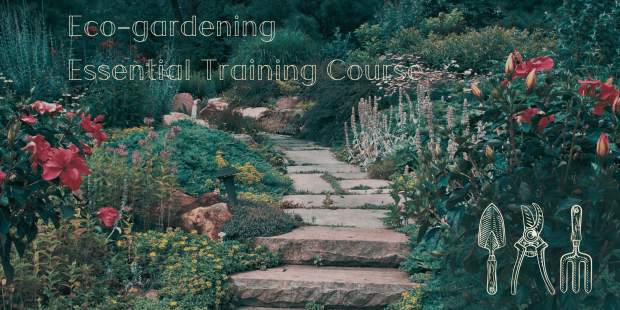The Northern School of Permaculture
You are here
Ecological Gardening Essential Training Course

This course takes place at the Laudato Si Centre eco-garden in Worsley, Manchester. The garden is part of the Laudato Si Centre that provides a setting for ecotherapy and outdoor learning for schoolchildren and the wider community.
The Laudato Si Centre eco-garden has an outdoor classroom, intensive growing areas, a forest garden, and is a place where you can enjoy nature while learning the art and science of sustainable gardening. From October 2022 to April 2023 you will have the opportunity to attend six modular courses on the Eco-gardening Essential Training programme at the Laudato Si Centre eco-garden.
This educational programme is brought to you by the Northern School of Permaculture and Ecospheres Design in partnership with the Laudato Si Centre. The lead tutor on this programme is Teresa Pereira.
The focus of the Eco-gardening Essential Training programme is on the application of permaculture principles to create and develop ecological gardens. You will gain insight, experience and confidence in regenerative gardening practice.
This programme was developed to bridge the knowledge gap between conventional landscaping, gardening and horticulture, and designing resilient eco-gardens and re-wilding projects.
It is an ideal CPD [Continual Professional Development] programme in Ecological Gardening Practice for teachers, and other professionals aiming to get started with creating, developing and maintaining outdoor learning settings.
After studying this programme, you will be equipped with the knowledge to create low-maintenance, sustainable eco-gardens. Ecological gardens are self-regulating green havens, designed to re-vegetate the Earth, capture carbon, nurture biodiversity and mitigate climate change.
EGET - Ecological Gardening Essential Training
You can attend the eco-gardening essential training programme as a foundation in ecological gardening theory and practice by completing the six modules, or alternatively as stand alone day courses. The programme is suitable for students who are new to permaculture as well as students who have completed the Permaculture Design Course.
If you are an experienced or budding gardener who practices horticulture and uses conventional gardening methods, this course will teach you how to adopt sustainable gardening methods.
You will gain insight and experience on how to garden with nature's intrinsic patterns: requiring less labour, using less external resources, closing the loop on waste, and developing gardens that work smarter, not harder. You will gain knowledge in how to optimise carbon capture and have a positive environmental gardening footprint.
Ecological Gardening Essential Training
Attending the full programme: six modules.
14 places available
The fee for the full programme is £216. Book your place.
You can pay securely via stripe. If you would prefer an alternative payment method, please get in touch. Schools and other organisations please contact us if an invoice is required before completing payment.
Eco gardening practice shifts the focus to low maintenance gardening, using regenerative patterns of cultivation found in natural systems. When a garden is well designed from an ecological perspective it generates abundance, biodiversity, and self-sustaining gardenscapes.
In this training course, you will learn:
- how to identify the type of soil you are working with, and select the ideal composting systems for your specific needs and site
- how to embed self-watering systems in the garden
- how to structure an eco-garden with permanent edible and medicinal planting schemes using trees and other perennials
- how to get started with seasonal, edible polycultures
- how to compost with worms, and embed wormeries in the eco-garden
Modular courses:
- Soil and the Art of Composting
- Self-watering Gardens
- Gardening with Trees and other perennials
- Edible Polycultures for Spring and Summer
- Edible Polycultures for Autumn and Winter
- Vermiculture, How to Compost with Worms
Course days run from 10 am to 4 pm latest. We have a one hour lunch break, as well as tea breaks mid morning and mid afternoon.
The modules and respective course days are as follows:
OCTOBER 2022
1. Art of Composting
Saturday - 08.10.2022
Unlock the mysteries of soil to design efficient polycultures. Soil is the foundation of the garden. Learn how to identify soil types to better understand which planting schemes can be easily integrated on different sites. To sustain long-term fertility in an eco-garden, the addition of organic matter as compost is essential. How would you design efficient composting systems that fit your site's needs, your lifestyle, and available time and resources? If you want answers, you will find them on this course day.
Hands-on activities:
- collecting soil samples and performing low tech tests to identify soil texture and pH
- auditing the needs of the site and available materials to define present and future composting strategies
2. Self-watering Gardens
Saturday - 15.10.2022
In our temperate climate, we are blessed with an abundance of rain. However, we often get too much at times, and occasionally, when most needed, none at all.
Learn the theory and practice of efficient self-watering systems for any size garden. Drought proof your garden and go on holidays knowing your plants shall be well watered. Conversely, learn how these same methods can prevent soil erosion and flooding during rainy seasons.
Hands-on activities:
- identify the watering needs of different growing areas to find out where to place open and closed self watering systems on site according to the water needs of different garden zones
- working in groups to design a self-watering systems concept proposal that fits the present and future needs of the eco-garden.
3. Gardening with Perennials
Saturday - 29.10.2022
Explore how to apply the ecological patterns found in forests to design permanent edible and medicinal cultivated habitats. These patterns of cultivation can be applied to any scale, from a patio or balcony garden to any acreage; although the focus of this day course will be on urban settings, ranging from private to community garden spaces. Perennials, such as trees are the structural engineers of the eco-garden, providing habitat and supporting biodiversity. Learn how to integrate trees with other perennials for long-term abundance, beauty, and carbon capture.
Hands-on activities:
- preparing an area in the garden to plant and edible hedge.
- planning planting schemes using a mix of perennials (and a few annuals) to plant the edible hedge's under layers with the aim of supporting the long term health of the trees and fruit bushes.
MARCH 2023
4. Polycultures for Spring and Summer
Saturday - 18.03.2023
From window box to market garden, you will learn how to design effortless planting schemes that nurture soil, wildlife, and people. First, we will explore the secrets of polycultures by learning the underlying principles that create successful communities of plants, and how you can use those patterns to design abundant edible and medicinal polycultures during the growing season.
Hands-on activities:
- locating and preparing a new bed to plant an edible polyculture
- planting a high density polyculture from seed with 7 to 12 different edible and medicinal annual plants (root crops, leaf crops, edible flowers and herbs).
5. Polycultures for Autumn and Winter
Saturday - 25.03.2023
The temperate climate and its short growing season challenge the cultivation of plants during the cold season. Nonetheless, with appropriate knowledge and planning, we can still grow plenty at this time of the year.
First, we will explore the secrets of polycultures by learning the underlying principles that create successful communities of plants, and how you can use those patterns to combine annual, and perennial, edible plants to mitigate the 'hungry gap', and develop an abundant and beautiful winter garden.
Hands-on activities:
- preparing a new bed to plant an edible polyculture
- planting a high density polyculture from seed with 7 to 12 different edible and medicinal plants that will provide leafy greens, edible flowers and root crops during autumn and winter.
APRIL 2023
6. Vermiculture - how to compost with worms
Saturday - 29.04.2023
Working with worms that turn organic waste into fine compost with ease and speed allows the eco-gardener to intensify seasonal cultivation strategies while replenishing and increasing soil fertility on an ongoing basis. We will build a wormery during this modular course, and learn how to design and implement different systems to compost with worms.
Hands-on activities:
- building and installing a wormery
- making worm towers to place in densely cultivated areas of the garden
All course days run on Saturdays from 10 am to 4 pm latest, in Worsley, near Salford. The current programme supports the development of the Laudato Si Centre eco-garden. On each course session you will have the opportunity to engage in practical activities designed to support and consolidate your learning.
Full programme fee
14 places available
The fee for the full programme is £216. Book your place.
If you need a payment plan, get in touch. Alternatively, you can also text 07790 386 869 with your name and EGET payment plan, and we will arrange a convenient time to discuss options.
Theme by Danetsoft and Danang Probo Sayekti inspired by Maksimer
